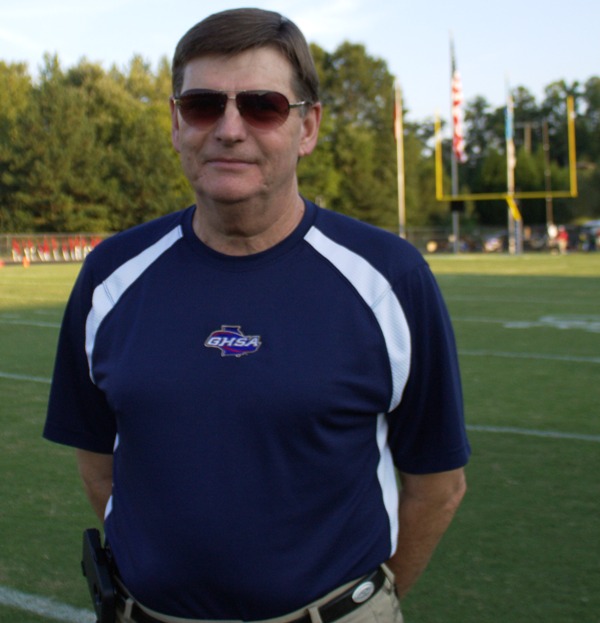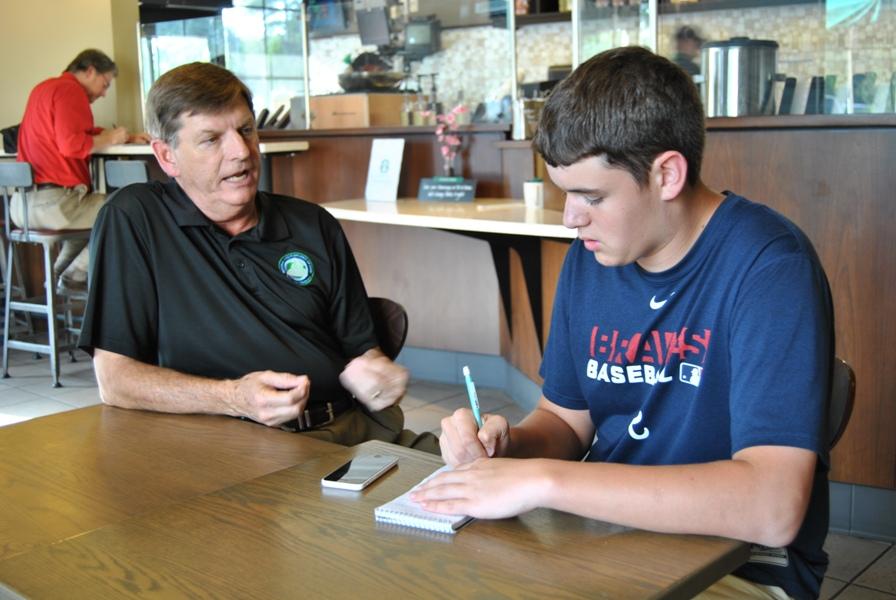GHSA’s new executive director long-time Fayette County figure
Sports editor junior Jack Fletcher interviews Gary Phillips (left), the new executive director for the Georgia High School Association. The former Fayette County High School principal was also Herschel Walker’s high school football coach at Johnson County High School.
April 12, 2015
The Georgia High School Association has never had an executive director from Fayette County. Until now.
Local resident, former coach at various schools, and former principal at Fayette County High School, Gary Phillips was named to that position on July 1, 2014.
Phillips, whose wife Barbara retired a couple of years ago from Starr’s Mill as the Health Occupations teacher, was voted in with a unanimous 52-0 ballot by the GHSA Board of Trustees. Phillips had worked the previous 13 years as the assistant executive director to the outgoing executive director, Dr. Ralph Swearngin.
Swearngin, who had been executive director since 2001, told the GHSA board that he planned to retire last year, so the board posted the job opening on its website. “I just followed the application process,” Phillips said. “I knew what they were going to require, and I didn’t get any special favors or shortcuts or anything like that. I just fell in line with the other applicants.”
As one of his last official acts, Swearngin recommended Phillips as his successor.
“I’m sure that had some influence, but I also knew everyone on the board from working with them the past 13 years,” Phillips said. “I knew the good things [about GHSA] and where the problems were, which is one advantage I had over someone from another state coming in.”
One of the first big challenges Phillips had to deal with was the process of reclassifying the 448 member schools. Districts and regions are redrawn every two years, but Phillips said GHSA begins working on boundaries about a year and a half in advance. Geographic locations and student populations are taken into consideration in order to give teams the best chance to be successful in competition.
According to Phillips, the biggest difficulty in this process is the public-private debate and determining whether those schools should be allowed to play each other in the regular season since they don’t play against each other in the playoffs anymore. Small private schools were separated into a new region after the last reclassification cycle because of sustained success against small public schools.

New Georgia High School Association executive director Gary Phillips stands on the football field at Starr’s Mill before a Panthers’ home game. He was elected with a unanimous 52-0 vote by the Board of Trustees.
There has always been controversy surrounding the small private schools and small public schools, Phillips said. The question now is whether those small public schools would be better off playing slightly larger public schools or continuing to play against smaller private schools, per GHSA.
“Reclassification is a never-ending fight,” Phillips said. “If we were able to fix it completely, things would be much more of a breeze. The way we do it, it never goes away.”
Another perennial issue that Phillips and his organization face is the number of complaints they receive regarding alleged illegal recruiting by some schools. Illegal recruiting occurs when a schools’ coaches or other officials attempt to persuade student-athletes to leave their current schools to attend their schools. Students are supposed to attend the schools in the districts where they live.
“Trying to determine what illegal recruiting is is like hemming up smoke,” Phillips said.
What they want us to do is make decisions and set up penalties from long-distance. They don’t want us to get close to the issue, and if there’s any trepidation about their involvement, they aren’t so willing to talk about it anymore.”
According to Phillips, most complaints come from schools after other schools in their districts have successful seasons after acquiring transfer students.
“Programs and schools will come to us and say, ‘How did they get so successful all of a sudden? What are they doing differently? How many students do they really have?’ The size of the school is really important because [they’ll] have more students to pick from,” Phillips said. “Some schools don’t really have to do much because [they have large student populations] and the rich just get richer.”
In addition to eligibility-related issues, Phillips and GHSA have also had to deal with the Georgia Legislature’s recent interest in their bookkeeping. Most of the legislature’s inquiries seem to center around the possibility that GHSA has more money than what it claims to have, Phillips said.
“Our question is why are they interested?” Phillips said with a laugh. “We don’t worry about their approach or their interest [in our books] because we don’t feel that we have done anything wrong other than some errors in the past in reclassification.
“There seems to be an element that [thinks] we make all this money, but that isn’t necessarily true,” Phillips said. “There is a staff of people that needs to be paid, and what’s left over we save so that we can do things for the schools.”
According to Phillips, GHSA uses the money from playoff ticket sales, among other things, to pay for game officials and their training through development camps, schools’ travel expenses, and championship game venues like the Georgia Dome. Teams that win their classifications also receive some money, he said.
Part of the money that the organization saves is for unique situations such as the recession that hit the United States in 2008. During this time, GHSA paid dues and fees such as physical therapy and surgeries for injured athletes to help schools get through the tough economic times, according to Phillips.
“Schools needed a break from payments during the recession in ’08-’09, so we paid for a lot of their expenses,” he said. “So now, in case of something like that happening again, schools are obligated to keep what we call a ‘rainy day’ fund, but that is what the profits we make are saved for.”
Prior to his life as a state high school association official and a high school administrator, Phillips might best be remembered as Herschel Walker’s high school football coach. The pair won the state championship together at Johnson County High School in 1979. Walker went on to star at the University of Georgia where he won the Heisman Trophy in 1982. Along with scoring a record-breaking 86 touchdowns in high school under Phillips, Walker was a straight-A student who excelled in basketball and track and field, according to Phillips. Despite Walker’s immense talent and the notoriety that followed him, Phillips said it wasn’t always easy being his coach.
“What made it tough was the recruiting process,” Phillips said. “College coaches would just show up at Herschel’s house at all hours, unannounced, so I had to step in a little to make sure that didn’t happen anymore.”
During this time period, the “bump rule” was still in place. The “bump rule” allowed a coach to accidentally “bump into” a recruit without it counting as an official contact. That is now illegal but when Walker was being recruited, it was permitted, and college coaches used it often.
“Coaches would be talking to me about him and would say, ‘When is the next bell? What hall is Herschel on? Is there a water fountain or bathroom on that hall?’ And of course I’d answer and when the bell would ring, they would say, ‘Excuse me for a second,’ and come back a few minutes later,” Phillips said.
Having someone with such a pedigreed background as Phillips as head of GHSA has some benefits, according to some coaches at Starr’s Mill.
“It’s nice to have (Phillips) around here,” head football coach Chad Phillips said. “Now that our vote on the [GHSA] board went to the athletic director at Ola High School when [former long-time Athletic Director Mike] Davis retired, we can just call him up and talk about the concerns we have.”
His experiences in the education system and in high school athletics made Phillips the one to succeed Swearngin for years to come.
“I’ve always enjoyed what I’ve done, and I hope to continue that trend as executive director,” Phillips said. “I feel fortunate to be here and in this situation.”





